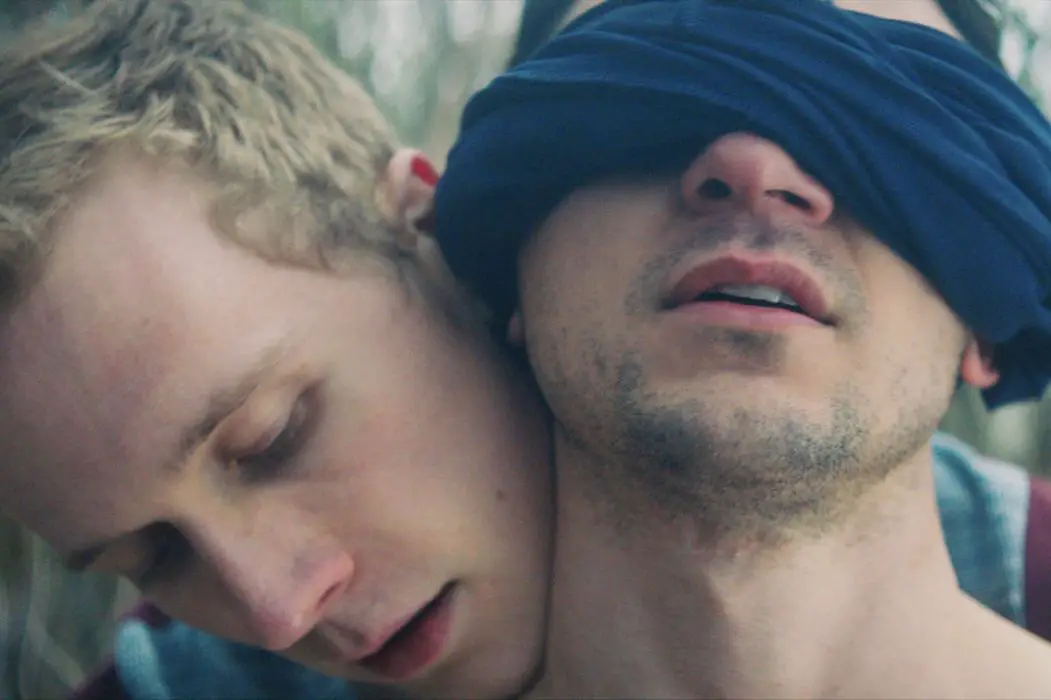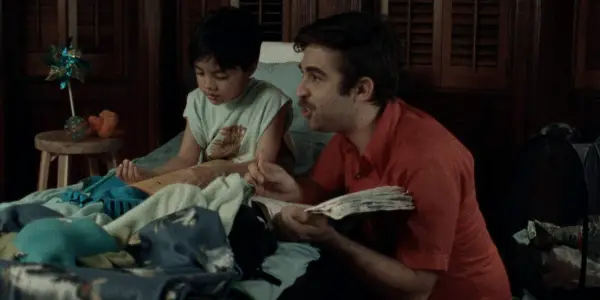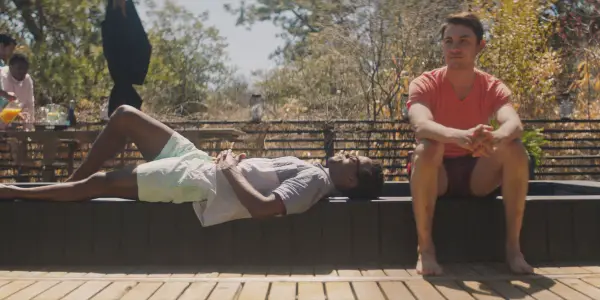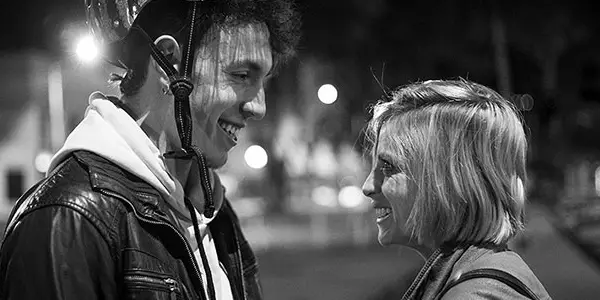NewFest LGBTQ: CUBBY, LAST FERRY & SECOND STAR ON THE RIGHT

Andrew Stover is a film critic/writer from the Chicagoland. His…
The following three films are premiering at New York’s LGBTQ Film Festival: Cubby, Last Ferry and Second Star on the Right.
Cubby (Mark Blane, Ben Mankoff)

The recklessness of youth is commonly associated with drugs, drinking and rebellion, anything but thinking about their future. The future in which they will have to get a financially stable job to pay their numerous bills, and a future in which they will settle down and their free time will be sliced significantly. From that intro alone, you probably think Mark Blane and Ben Mankoff’s coming-of-age story is about an impulsive teenager, but you would be wrong. Cubby follows 26-year-old gay artist Mark (Blane), who is moving from a small town in Indiana to New York City where he avows to have gotten a job as an art gallery receptionist — but he’s lying.
We soon learn Mark is very mercurial, assuming childlike dispositions, suffering from anxiety and drawing BDSM-inspired artwork. Strapped for cash (obviously, because he doesn’t actually have a job like he originally told his mother when she drove him here), Mark obtains a babysitting job for a 6-year-old boy, Milo (Joseph Seuffert). Mark and Milo do some arts-and-crafts and eat bouts of candy, but Mark can’t escape adult responsibilities. The babysitting job provides very little money, and a completely clueless and impetuous Mark can’t pay rent, resorting to drug-laced psychedelic cupcakes to blur reality. The drug-laced cupcake ignites hallucinations, conjuring up Leather-Man (Christian Patrick), Mark’s very own BDSM superhero. Leather-Man is a figure of confidence and wisdom, and he helps Mark come to terms with adulthood.
Cubby is an exceedingly quirky coming-of-age tale that follows a 26-year-old man, still mired in a whimsical haze of childhood bliss. It’s unclear why Mark felt the desire to move to New York City, without a job, without anywhere to live, and without any direction. When his mom (a modestly funny Patricia Richardson) drops him off, unaware of her son’s unemployment and homeless status, she comically bestows some “wisdom” to calm Mark’s frayed nerves: “Mark, you are somewhat unbearable. But all the unbearable people move here, you’re gonna kill it.” So he wanders around New York City and ends up becoming a babysitter for a young, frivolous boy named Milo, and renting out a room with a bunch of insufferable roommates he knew back in the day. Anxious, immature and childish, it’s no wonder why Mark is able to connect with Milo.
Mark Blane as the babysitter and Joseph Seuffert as Milo have winning chemistry, but Mark acts more like a fellow kid by his unregulated verve and imagination. Addicted to anxiety pills, obsessed with BDSM and beguiled by simple arts-and-crafts, Mark isn’t exactly configured like everybody else — but just because he’s more invested in puerile-like gambits, doesn’t mean he should be treated any different from everybody else. Cubby lightly scavenges for value as it tries to observe how far one would go to protect their childhood. For Mark, neglecting all of the implications that adulthood inspires thrusts him to take anxiety pills. And when those pills are gone, he takes a bite into a psychedelic cupcake, and hallucinations ensue — including the advent of the burly and temptingly intimidating BDSM superhero, Leather-Man!
It sounds much more juicy, steamy and kooky than it actually turns out to be. Leather-Man arrives on-screen when Mark is strolling through the park, losing a grip on real-life and staring aimlessly at the sky, only for Leather-Man to lend a hand. Radiating an inscrutable, forbidding and soothing presence, Christian Patrick is appropriately heroic, at least when it comes to Mark’s perspective. Leather-Man gives Mark money and advice on communication, but nothing really sticks the landing. At one point, Mark asks, “What would Leather-Man do?” Well, not much apparently. And Leather-Man is one of many characters who are insufficiently employed.
Milo’s mother (Jeanine Serralles) implies compassion when it comes to Mark’s peculiarity and his friendship with Milo, but when she finally threatens their friendship, the emotional weight is missing. Mark’s crush on a guy named Russell (Rodney Richardson) is certainly pleasant and gives Mark optimism for romance, but the manner in which they progress as a couple doesn’t happen organically. Despite their chemistry, Mark and Milo aren’t in enough scenes that spotlight their connection in its entirety (there are many happy moments, but not many sad moments that probe Mark’s ability to babysit a child, when he’s pretty much a child himself).
Through hand-drawn animation (which looks to be inspired by airbrush), Mark’s childlike wonder is wonderfully depicted, with scene transitions that sketch the setting of the next scene before uncloaking the actual location. Shot on 16 mm film, and sprinkling the hallucinatory elements into Mark’s reality with utmost proficiency, the style of Blane’s film is quite appealing.
Spanning 83 minutes, the script is trying to juggle the intricacies of adulthood. Occasionally funny and well-intentioned, Mankoff and Blane’s bizarre comedy ensures the hotheaded 26-year-old manchild is still fairly easy to sympathize with. Yes, he should grow up and face the harsh reality of adulthood, but he shouldn’t completely change who he is and treated differently because of who he is. Regrettably, any evolution Mark may have gone through isn’t keenly explored. Cubby is still vaguely enjoyable and endearingly weird, but it’s still grades away from testing out of ordinariness.
Cubby premieres at the New York’s 31st Annual LGBTQ Film Festival on October 25, 2019.
Last Ferry (Jaki Bradley)

Last Ferry is a reasonably tense gay thriller from the mind of Jaki Bradley. Unfolding gradually, Last Ferry follows Joseph (Ramon O. Torres), a young gay lawyer living in Harlem, who hops on a ferry one day and ventures to the famed Fire Island, hoping he’ll find romance. Unfortunately, Joseph visits Fire Island in the off-season, and the parties he was hoping to find are nonexistent. Nowhere to go, he sits on the beach alone, left with his phone that only ever rings when his assertive mother and boss calls. But a sweet boy loiters behind him, guiding Joseph to a secluded area, promising a slice of romance Joseph came for — but he’s drugged and mugged by this man.
With no belongings, and woozy from the drugs, Joseph experiences a cloudy murder and barely escapes. He wakes up in a beach house under Cameron’s (an engaging Sheldon Best) care, slowly developing feelings for Cameron. The murder he thought he saw becomes distorted by the present, but the murderer resurfaces under his nose. Last Ferry scarcely hints to a rousing gay noir, never wholly fulfilling its potential, but works more often than it doesn’t.
Ramon O. Torres (also credited as a writer) gives a deliberately passive lead performance, playing Joseph with discernible suspicion and loneliness. Joseph is suitably awkward and despondent, dangerously invested in work, knowingly so, which is why he travels to Fire Island with prurient curiosity (but without any literal baggage). Arriving on Fire Island with his work suit still on, Joseph isn’t used to having fun and he’s distrustful of everyone. He obviously didn’t know April on Fire Island is rather achingly serene. The tranquility of the seashore setting immerses you in because something unpleasant is boiling beneath the surface. After Joseph gets mugged (the suspense during that scene is palpable and controlled, transpiring steadily), he finds comfort in the hands of Cameron, a softhearted man who takes him in after finding him passed out on the beach.
From there, Joseph and Cameron grow fond of each other, and Joseph enjoys the company of Cameron’s friends. The arrival of Cameron’s friend Rafael (a nuanced and hard-edged Myles Clohessy), however, amplifies the tension and halts the fun. Each character is deliciously cryptic, consciously masking life-altering secrets until they can’t be contained any longer. The groundwork for the mystery is laid out in a sun-drenched, luxurious setting, where everybody is clearly hiding something, but it’s not deftly utilized. The pieces are heedfully set up, with Joseph exuding a kind of vulnerability and distrust that prompts him to react recklessly and out of suspicion; and the murder is an underlying occurrence that leisurely becomes more consequential. But it’s really Clohessy’s performance as Rafael, and his wobbly, menacing makeup, that keeps one interested in what all of this is about.
Woefully, the pieces don’t form an impactful, jointed whole. The backstories of each character and each plotline are left ill-defined, which may have been intentional, but the film’s cagey configuration doesn’t help establish the gravity of the conclusion. Last Ferry is beautifully shot on location, cultivating an ambiance of lust and perfidy, as well as spotlighting Alexa Wolf’s lush cinematography (which is constantly bright, somewhat shaky yet contained). The end product isn’t perfection, but this gay lawyer’s journey to Fire Island to escape monotony and find luxury is rescued by its cast and crisp cinematic style.
Last Ferry premieres at the New York’s 31st Annual LGBTQ Film Festival on October 25, 2019.
Second Star on the Right (Ruth Caudeli)

Ruth Caudeli’s hugely earnest Spanish-language drama Second Star on the Right takes its precious time to school us on a message we’re already extremely familiar with: Growing up can be really difficult, but you have to grow up. Despite the familiarity of the message, Caudeli’s execution is artful enough to hammer the message in with revitalized impact. Toying with color and saturation, Caudeli tries to replicate the mood via color, and succeeds. Filmed mainly in black and white, and deploying a negligent 30-something woman in an adult world, Second Star on the Right shines a light on the tribulations of adulthood, while appearing visually bleak and cold.
Emilia (Silvia Varón), an insouciant bisexual woman refuses to grow up as her female friends already did. Angélica (a fairly powerful Alejandra Lara), one of Emilia’s friends, is getting married. Her other friends, Clara (Tatiana Renteria) and Renata (Ximena Rodriguez), seem to have their lives together. Still living with her mother, juggling a relationship with a woman named Mariana (Diana Wiswell), and trying to remain an actress by teaching acting classes, Emilia’s life is turned upside down when she’s fired from her teaching job and forced to take an ordinary job at Angélica’s company as a receptionist.
Silvia Varón (who is also credited as a co-writer, which probably explains why Emilia is still sympathetic despite her faults) gives a magnetic, reserved and spellbinding performance as Emilia. Opening to home video footage that shows the group of friends playfully messing around in the pool, the scene transition to modern-day instantly embraces the black and white stylistic choice, while unmasking a self-conscious Emilia as she looks at herself in the mirror (repeatedly saying, “One girl is more use than 20 boys”). Emilia is messy and immature, partying with a younger crowd and drinking profuse amounts of alcohol. She’s visibly unhappy. But we all have our own doubts, desires and secrets, which definitely includes her opinionated friends. Emilia just happens to emit her flaws in a more noticeable manner, and it’s easy to judge her.
The other female characters aren’t given nearly as much screen time as Emilia, but they do get a chance to verbalize their troubles and feelings. In various moments, the color is restored, usually in party scenes where Emilia feels the most alive. Emilia wants to be an artist; she wants to express herself with her own creativity and range, yet growing up also means being able to afford to live your life. You need financial stability, realistic expectations in hazy times. For the most part, Emilia and Mariana have delightful chemistry, and their relationship does hold value. While wrestling with the hardship of adulthood, Caudeli incorporates the preconception of bisexuality, and how people, even friends, don’t believe it exists. Although allured by Mariana, Emilia firmly states she’s a bisexual, through and through.
Alongside the perpetually shifting color dynamics of the film, it also branches out into music territory. Occasionally, characters burst out singing their troubles like they really do live in a lightheartedly somber musical. Strangely enough, the sudden music breaks function quite well. The music segments help foster the importance of having “a song in your heart”. The fashion in which the camera is positioned is regularly purposeful. When a rift is untangling between Emilia and Mariana, Emilia visits her in an attempt to sleep with her, and a static shot of them from a distance emulates their actual distance. Later on, Emilia tells Angélica something out of frustration, and Angélica begins to laugh but we still stay on Emilia’s crestfallen face. Care obviously went into structuring these relationships; Caudeli accomplishes a lot in a mere 80 minutes. So while most of the picture is in black and white, and Emilia’s search for financial security and responsibility hinders her acting career (“The thing is that I no longer own my time”), a nugget of optimism is planted at the end.
Ruth Caudeli’s Second Star on the Right is a finely-acted, exquisitely crafted exploring adulthood, friendship and femininity with contrasting styles. Whether it be humorous, dramatic or musically inclined, the film’s aura is infused with inward chaos, unsuspecting beauty and muted hostility. Emilia’s vexation is left quiet and sealed until the last ten minutes, and that’s where friendships are transiently punctured. But the truth is, nobody’s free from fault, and we all grow and evolve as human beings in disparate directions.
Second Star on the Right premieres at the New York’s 31st Annual LGBTQ Film Festival on October 25, 2019.
Are you planning to attend the festival? Have you seen any of these films? Let us know below!
NewFest LGBTQ is happening in New York between 23-29 October 2019. Get your tickets & passes now.
Does content like this matter to you?
Become a Member and support film journalism. Unlock access to all of Film Inquiry`s great articles. Join a community of like-minded readers who are passionate about cinema - get access to our private members Network, give back to independent filmmakers, and more.
Andrew Stover is a film critic/writer from the Chicagoland. His film & TV reviews can be found on Film Inquiry & Film Threat.













